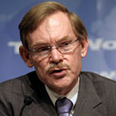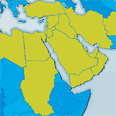

"We must act now," said World Bank President Robert Zoellick at the close of the two organizations' meetings in Washington.
"Waiting for the situation to stabilize will mean lost opportunities. In revolutionary moments, the status quo is not a winning hand."
The Bank earlier warned that "a worsening of conditions in the Middle East and North Africa could derail global growth.
"If oil prices were to rise sharply and durably – either because of increased uncertainty or due to a significant disruption to oil supply – global growth could slow by between 0.3 and 1.2 percentage points in 2011 and 2012, respectively," it added in a statement.
In the wake of the January revolt in Tunisia against a longstanding autocratic government, which sparked similar uprisings in Egypt, Libya, Yemen and Bahrain, Zoellick said the Bank agreed to support reforms in the region.
"We need a new social contract where governments listen to their people and include them in their development process," he said.
IMF managing director Dominique Strauss-Kahn pointed to the problem of a jobless recovery in the global economic revival, which is more acute as turbulence spreads across the Arab crescent -- where unemployment for youth is particularly high.
"The example of the Middle East and North Africa (highlights) this question that you may have good figures at the growth level without having the sustainability of growth, just because of the political problems behind it."
"We stand ready to help" with technical and financial assistance, he added.
New risks, wrenching challenges
The uprisings that overthrew longtime strongmen in Tunisia and Egypt while challenging others from Libya to Syria and Yemen grabbed the focus of the world's financial technorati as they met in Washington to discuss the crucial challenges facing the global economy.
Zoellick stressed earlier in the week the impact of rising food prices on political stability in poor countries.
"We may be coming out of one crisis – the financial and economic crisis – but we are facing new risks and wrenching challenges," he said.
"Food prices were not the cause of the crises in the Middle East and North Africa, but they are an aggravating factor."
Chad's Finance Minister Ngata Ngoulou said his country was feeling the heat from the spillover of Libya's European- and US-backed uprising against dictator Muamman Gaddafi.
"All this has repercussions on Chad, repercussions above all negative on the economy and on our society. It weighs on our resources," he said.
Other countries "have not considered this situation," he added.
French Finance Minister Christine Lagarde, who chaired a Group of 20 finance chiefs meeting on the sidelines of the World Bank-IMF meetings, called for strong support for the North African countries from governments and multilateral agencies.
She said international financial institutions need to begin assessments "in particular of those countries that have initiated a transition towards democracy."
"The economies of these countries are facing specific structural problems," she added.
France will boost its annual commitment to Egypt to €250 million ($360 million) from €150 million.
"If priority is to be accorded to inclusive and sustainable growth, issues of justice, security and employment, particularly in the private sector, can no longer be addressed separately," Lagarde said.
"This is also one of the lessons to be learned from the events in North Africa and the Middle East."
Lael Brainard, US Treasury under-secretary for international affairs, said the World Bank, International Finance Corp and African Development Bank together could potentially muster $4 billion for Egypt and Tunisia in the next year, to help them restart their economies.
The European Bank for Reconstruction and Development was also positioning itself to take a lead in the effort, according to an EBRD official.
- Follow Ynetnews on Facebook















